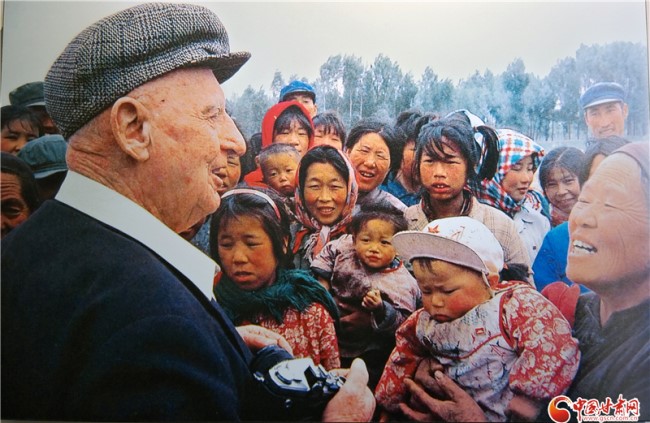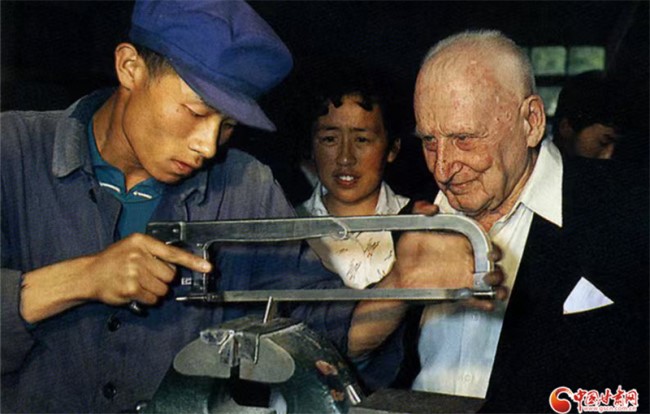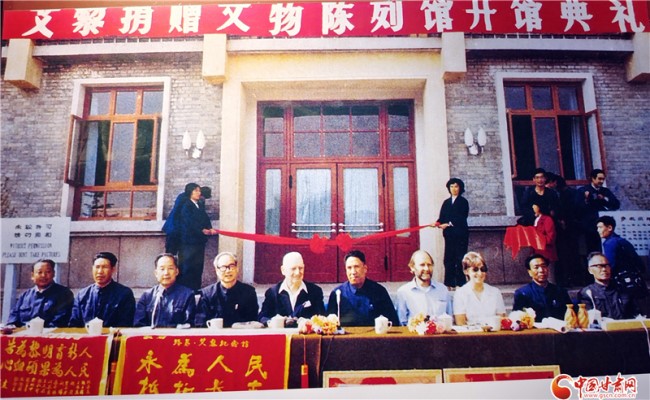Salute Rewi Alley, a great soldier of internationalism
Rewi Alley, a social reformer and educator from New Zealand, spent 60 years in China's revolution and construction. He was known as the initiator of the Gung Ho (Chinese industrial cooperatives) Movement and founder of the Bailie School. His stories are still widely told on Chinese land.
In 1927, Rewi Alley, who was about to enter his 30s, travelled across the vast ocean to China and landed in Shanghai. That was the time when the cooperation between the Kuomintang (KMT) and the CPC broke down and the Chinese Great Revolution failed. Alley saw with his own eyes how the Chinese people suffered from exploitation and suppression at that time.

Rewi Alley (L) talks with villagers in Shandan county, Gansu province. [Photo/gscn.com.cn]
In the early phase of China's war of resistance against Japanese aggression, China lost vast areas of land, numerous people lost their jobs, and the country's industrial system was on the verge of collapse. In 1938, together with Chinese patriots, Alley set up the Chinese Industrial Cooperatives and initiated the Gung Ho Movement, aiming to mobilize workers and refugees to support the Chinese army by boosting production of manufactured goods.
To promote this undertaking, Alley gave up his comfortable life in Shanghai and travelled, on foot or on a bicycle, more than 30,000 kilometers across 16 provinces. It was a life-risking trip full of hardships - bombing, traffic accident, illness, manhunt and betrayal, yet Alley never wavered in his determination.
Alley's efforts led to the thriving of a large number of industrial cooperatives. According to statistics, more than 3,000 industrial cooperatives emerged in China between 1939 and 1942. They created over 300,000 jobs, provided huge material and personnel assistance for the frontline battles, and greatly inspired the Chinese army and the Chinese people.
During the Gung Ho Movement, Alley realized that in order to provide technical and managerial professionals for the cooperatives, there must be organized, scheduled training for workers, and vocational education became an urgent task.

Rewi Alley (R) teach students to operate a machine in Shandan county, Gansu province. [Photo/gscn.com.cn]
In 1942, Alley and British journalist George Hogg jointly founded the Bailie Polytechnic School in Shuangshipu, Shaanxi Province (which was later relocated to Shandan County, Gansu Province in 1944).
"Bailie," or "Peili" in Chinese, means "cultivating talents for the dawn of China." Alley hoped that the school could help train technical professionals urgently needed in China's revolution. With this aspiration, he overcame the hardships posed by the shortage of materials and the pressure from the KMT, and devoted all his energy to the school's development.
More than 20 production groups featuring machinery, ceramics, glass, coal mining and transportation were established in the school, which cultivated a large number of technical backbones and management talents for New China's petroleum industry.
Alley never married. Yet, he adopted many children of poor families and revolutionists, brought them up, and taught them to be useful members of society. Alley called his children "greeters of the dawn" and encouraged them to work hard for a new China. For the students of Bailie School, as they recalled, Alley was more of a father than just a great man.
In the years after the founding of the People's Republic, Alley continued his writing career. By putting his love and understanding of China into words, he hoped to help the world know more about China. He wrote more than 70 books about his days in China and other countries.

Rewi Alley (R) donates his collection of cultural relics to Shandan county, Gansu province. [Photo/gscn.com.cn]
Throughout his life, Rewi Alley was very fond of the years of working and living with Shandan teenagers. On the wall of his room were oil paintings depicting the scenery of Shandan county. He often said: "These years were the happiest and most fulfilling of my life."
In 1980, Rewi Alley donated all the 3,702 cultural relics he collected during his stay in China to Shandan people. In 1982, he proposed to build a library in the county. He used part of his salary to buy books every month, and finally gave 2,469 pieces as dedication to the public.
In December 1987, Rewi Alley passed away at the age of 90 in Beijing. He had spent two-thirds of his life in China. Through the tough years of war and revolution and the decades of socialist construction, Alley had always stood side by side with the CPC and was therefore loved and respected by the Chinese people.
-
As AI encounters Dunhuang's art, the ancient caisson ceiling bridges centuries to the present.
View all stories

 Gansu thrives from green development
Gansu thrives from green development  >
>